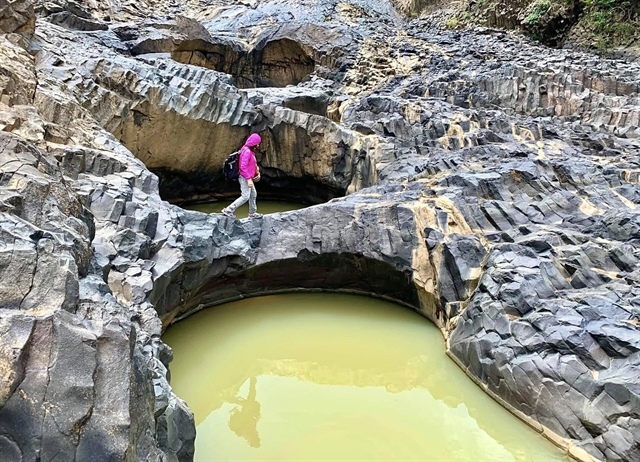A newly-discovered ancient rock field in Gia Lai Province’s Đôn Hyang Village is luring visitors with its surreal charms.

The ancient rock field is an ideal destination for the young to check-in and explore the unique beauty of nature. Photo news25link.com

Part of the ancient rock field in Đôn Hyang Village, Mang Yang District. Photo vietnamtourism.gov.vn
The Central Highlands province of Gia Lai is the homeland of various ethnic minorities in Việt Nam, such as the Gia Rai, Ba Na, Xơ Đăng, Thái and Mường, and has a rich cultural diversity and heritage.
It is also a land of irresistible charm thanks to its wild natural landscapes, among them the newly discovered ancient rock field of Đôn Hyang Village in Mang Yang District's Đê Ar Commune.
The rocks increasingly lure visitors, attracted by their sheer majesty. Located downstream of the H'Chan Hydroelectric Plant, about 45km east of Pleiku City, the million-year-old rock field leaves tourists amazed.
The area was previously hidden, until the building of the H'Chan Hydro Electricity Plant that stopped the local river flowing in mid-2021. For quite a long time, the rocks were submerged by the water of the Ayun River, the significant erosion adding to the stunning landscapes fused by the march of time.

A visitor explores the beauty of rock pools formed inside the ancient rock field in Đôn Hyang Village. Photo news25link.com
The continual flow of the river over millions of years had created the rock formations, stacked or interlaced, to produce an impressive natural monument,
The stone columns have a relatively regular hexagonal shape, standing upright at right angles, obliquely or parallel to the ground. They were once igneous magma erupting from a volcano, so have a deep hardness.
The road down to the rock field is long and winding, with many slopes. The ancient stones in Đôn Hyang Village form a large cube with many slippery pits, and visitors must wear sturdy shoes and walk carefully when in the area.
Beautiful rock pools
There are also several beautiful rock pools nearby where people can cool off. Some are up to 6-7m deep, so travellers must exercise caution when visiting. In addition to the ancient rock field, there is a beautiful waterfall, perfect to rest or take photographs.
Upon arrival, visitors can ask workers at the H’Chan Hydroelectric Plant for instructions. The area often welcomes groups of visitors, mostly teachers, students and young people from the communes of Chư Sê and Mang Yang districts.

Stone columns at the newly discovered rock field stand in a perpendicular direction. Photo vietnamtourism.gov.vn
Nguyễn Quang Tuệ, head of the Cultural Management Office under the Gia Lai Department of Culture, Sports and Tourism, recently spoke about the structure and geological value of the field, which he has discussed with geologists.
"The ancient rock fields in the Central Highlands are millions of years old and are similar to the Ghềnh Đá Đĩa (Cliff of Stone Plates) in Phú Yên Province," he said.
Tuệ said he had visited the Đôn Hyang rock field as a tourist in 2021 and was amazed by the magnificent site.
"I followed the footsteps of two workers from the H'Chan Hydropower Plant to visit the rock field. In the sunlight of the early morning, we reached an area of dark grey rocks layered side by side, stretching hundreds of metres, forming a heartbreakingly beautiful scene," said Tuệ in an article on the Việt Nam Tourism Administration website.
He said the department was coordinating with functional bodies to survey and evaluate the status of the Đôn Hyang ancient rock field to include it in the provincial tourism development programme.
In recent years, more and more visitors have travelled to the site, particularly at weekends. Sadly, some seem unaware of the importance of protecting the environment, leaving a lot of rubbish behind.
"Stepping on the million-year-old stone floor, you will feel really cool. The rough and sediment rocks are shown clearly through the rain and sun, and are well-worn by time. With the water drying up, rocky seams and pools have been revealed with some water inside reflecting a beautiful blue colour," Trần Văn Luồng, a resident of Đê Ar Commune, said.
"The beautiful and attractive rocks have lured more and more tourists, particularly young people, to come and take pictures." VNS